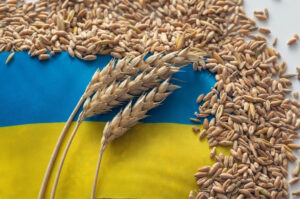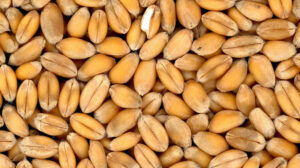
Following the meeting of the coordination platform on Ukrainian grain exports, no decision was made on whether or not to extend the current temporary ban on grain imports to Poland, Hungary, Romania, Slovakia and Bulgaria, which expires on September 15.
This was reported to Interfax-Ukraine on Wednesday after the 9th meeting of the joint coordination platform, chaired by the head of the cabinet of the Vice President of the European Commission Valdis Dombrovskis, Mr. Hager.
According to her, the first part of the meeting was attended by representatives of five member states, Ukraine, the Republic of Moldova and the Commission. “The Commission presented the latest forecasts of the market situation in terms of harvest, trade and prices. Countries were invited to share the latest information. The platform also discussed how to increase storage capacity and reduce border crossing time. Finally, they exchanged views on short-term actions to facilitate trade flows and on ways to support transport,” the EC representative said about the content of the first part of the platform meeting.
According to Garcia, the second part of the meeting, which was attended by representatives of Estonia, Latvia, Lithuania, Greece, Italy and Croatia, was devoted to alternative routes.
“In the context of this meeting, the Commission informed that no decision has yet been made on preventive measures, the phased abolition of which is scheduled for September 15, 2023. In any case, the Platform will continue to meet regularly and monitor grain imports from Ukraine,” the European Commission representative stated.
As you know, in May 2022, the EU decided to temporarily suspend import duties, quotas and trade remedies on Ukrainian exports to the European Union – known as autonomous trade measures – to help alleviate the difficulties faced by Ukrainian producers and exporters after the Russian invasion. At the same time, following logistical problems in Bulgaria, Hungary, Poland, Romania, and Slovakia caused by imports of wheat, corn, rapeseed, and sunflower seeds originating in Ukraine, exceptional and preventive measures on their imports came into force on May 2, 2023, and were extended on June 5.

The U.S. Department of Agriculture in its September review lowered its estimate of India’s rice exports next year to 17.5 million tons from 19 million tons in the August forecast. This year, exports are expected to reach 20 million tons.
World rice prices have soared to 15-year highs amid export restrictions imposed by India, the world’s largest rice exporter, the USDA said. In July, the country imposed a ban on the export of most rice varieties, followed by an export duty on steamed rice and a minimum export price for basmati. Importers switched to other major suppliers, such as Thailand and Vietnam, and as a result, their export prices rose to the highest levels since 2008.
At the same time, even before India’s restrictions, rice prices were rising amid strong demand from importers and declining production in a number of countries.
In 2008, India, at that time the second largest exporter of rice, also imposed export restrictions, which led to a sharp rise in prices. After the restrictions were lifted in 2011, the country increased supplies to the global market and became the largest exporter the following year, and has maintained this position since then. In 2022, India exported slightly more than the next four suppliers combined, accounting for about 40% of global supplies. Since 2020, the country has been supplying white rice at the lowest prices, especially to sub-Saharan Africa. The sharp rise in prices is expected to have a significant impact on these import-dependent countries.
Despite the significant increase in export prices, they have not reached the record levels of 2008, as export restrictions are less severe this time. In addition, Vietnam, which stopped exports in 2008, is now resuming shipments.
According to the USDA forecast, global rice exports this year will amount to 53.11 million tons (56.12 million tons last year). Next year, supplies may decline to 52.1 million tons (the forecast was lowered from 53 million tons, according to the August estimate).

The European Commission may extend for another two months the embargo on imports of Ukrainian grain, including wheat, corn, rapeseed and sunflower seeds, to Poland, Hungary, Romania, Slovakia and Bulgaria.
A source close to the negotiations told Interfax-Ukraine on Wednesday in Brussels.
As you know, a meeting of the coordination platform is taking place in Brussels on Wednesday with the participation of the countries concerned.
“It is proposed to extend the ban on imports of Ukrainian grain for two months. It is not yet known when the official decision will be made,” he said.
At the same time, the deadline for the ban on Ukrainian grain imports expires on September 15.
As you know, in May 2022, the EU decided to suspend import duties, quotas and trade remedies on Ukrainian exports to the European Union – known as autonomous trade measures – to help alleviate the difficulties faced by Ukrainian producers and exporters after the Russian invasion. At the same time, following logistical problems in Bulgaria, Hungary, Poland, Romania, and Slovakia caused by imports of wheat, corn, rapeseed, and sunflower seeds originating in Ukraine, exceptional and preventive measures on their imports came into force on May 2, 2023, and were extended on June 5.
A day earlier, on September 12, European Commissioner for Agriculture Janusz Wojciechowski spoke in the European Parliament about the need to maintain the ban on imports of wheat, corn, rapeseed and sunflower seeds from Ukraine to Bulgaria, Hungary, Poland, Romania and Slovakia. According to him, this decision has proved to be effective and should be extended after September 15 with the simultaneous expansion of the Solidarity Roads for the transit of these Ukrainian products. “We have found a solution that, firstly, stabilized the market in these (five) countries, and, secondly, allowed us to increase transit from 2.9 million tons before the ban from Ukraine to 3.2 million tons after the ban was introduced,” he said.
According to the EC, 44 million tons of agricultural products have already been transported from Ukraine via the road and rail “Solidarity Roads” of these countries, and according to current forecasts for this marketing year 2023-2024, Ukraine needs to export 56 million tons of grain, or 4.7 million tons on average per month. “The Black Sea is blocked, and no one knows if it will be unblocked by Russia. Russia knows what it is doing in this regard, what criminal activities it is conducting, and it is using food as a weapon. But we are able to help Ukraine export these 4.7 million tons by land through the Solidarity Corridors. We just need to improve and expand these corridors,” the European Commissioner emphasized.
Wojciechowski mentioned Baltic ports as new routes: Lithuania, Klaipeda, Riga, and the ports of the Adriatic, as Romania is practically unable to increase transit.

Oil prices of benchmark grades remain in the plus on Wednesday afternoon after the release of the monthly report of the International Energy Agency (IEA) ahead of the publication of official data on oil inventories in the United States. Quotes for November Brent crude oil futures on the London-based ICE Futures exchange at 14:47 Q4 are trading at $92.54 per barrel, up $0.48 (0.52%) from the previous session’s close.
WTI crude oil futures for October on the electronic trading of the New York Mercantile Exchange (NYMEX) rose by $0.48 (0.54%) to $89.32 per barrel by the indicated time.
The expected growth in global oil demand by 1.5 million bpd in the second half of 2023 compared to the first half of the year will outstrip supply by 1.24 million bpd, according to the IEA report.
The agency estimates that the world oil market balance turned into a deficit in the third quarter as more active supply cuts coincided with record high demand.
Thus, the IEA estimates a deficit of 1.5 million b/d in July and 1.7 million b/d in August, the highest since 2021, when a record OPEC+ supply cut was implemented to reduce the surplus accumulated during the COVID-19 pandemic.
In the first quarter of 2023, the IEA estimated an oil market surplus of 1.5 million bpd in the first quarter and 80,000 bpd in the second quarter.
The U.S. Department of Energy at 17:30 Wednesday will publish a weekly report on commercial stocks of oil, gasoline and distillates in the country. The data of the American Petroleum Institute (API) released the day before showed an increase in oil reserves by 1.174 million barrels at the end of the week ended September 8.

“DTEK Energo plans to import about 210,000 tons of coal from Poland for more reliable passage of the autumn-winter period by thermal generation, the energy holding company said in a press release on Wednesday.
Under the fuel import contract, an agreement has been reached on the supply of thermal coal throughout the heating season, starting from September 2023 and until March 2024.
As the company noted, the first coal shipments are expected as early as this week.
“In the conditions of war, unpredictable actions of the enemy and the increased load that the company’s thermal power plants have been carrying in recent months, additional volumes of imported fuel will allow to “back up” and provide an additional margin of safety for a more stable passage of the nearest heating season by thermal generation,” said Ildar Saleev, CEO of DTEK Energo, quoted in the press release.
As reported, DTEK Energy’s thermal power plants have increased their electricity output by 28% over the last four months compared to the same period last year. In turn, in August, when consumption was at record highs for the summer due to the heat wave, power engineers generated 35% more electricity than in August 2022.
In just eight months of this year, DTEK Energy’s thermal power plants supplied almost 9.9 bln kWh of electricity, which is equivalent to the average consumption of about 3.3 mln households during the year.

Deputy Prime Minister – Minister for Reintegration of Temporarily Occupied Territories Iryna Vereshchuk suggests representatives of international organizations to become members of the Coordination Centers for Support of the Civilian Population at regional military administrations (OBA).
“We should focus on working with organizations that help people with disabilities,” Vereshchuk is quoted by the press service of the department following the forum “Inclusion and participation: people with disabilities at the center of humanitarian response policy during the war”.
In this regard, Deputy Prime Minister urged international organizations to actively assist vulnerable categories of people next year.
In addition, Vereshchuk suggested that representatives of international organizations should be included in the Civilian Support Coordination Centers set up at regional military administrations across Ukraine so that they could directly participate in decision-making on the ground.
The forum “Inclusion and Participation: People with Disabilities at the Centre of Humanitarian Response Policies in Times of War” was organized by the National Assembly of People with Disabilities of Ukraine with the support of the International Foundation for Electoral Systems (IFES) as part of an international technical assistance project aimed at increasing accessibility of political and public life, as well as full inclusion of all citizens in the democratic process. Any views expressed during the event are those of the authors and do not necessarily reflect the views of IFES.
The National Assembly of People with Disabilities of Ukraine has more than a hundred organizations representing the interests of people with various disabilities. Since the first days of the war, organizations have been providing humanitarian aid to people with disabilities and the elderly from different regions of Ukraine: food, hygiene products, assistive technologies, medicines, and non-food essentials. The organizations have created shelters (5 regions), spaces for children (various locations in 18 regions), and provide counseling and psychological support. The NAIU works with civilians and military personnel who have acquired disabilities as a result of the war, advocates for the protection of the rights of people with disabilities in various areas, and more.
Valeriy Sushkevych is the Chairman of the National Assembly of People with Disabilities of Ukraine.